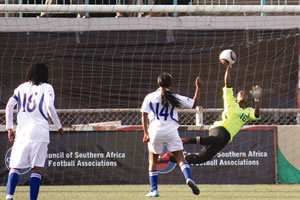Let’s not abuse fruits of independence

up a tree.
The same hare, whose trickery is known in foreign lands, has sought and achieved fame abroad but never at home, for, when called to hold its own, the hare has no known territorial chiefdom.
Even in oral tradition, when the animal society gathers to dig a well to beat a life-threatening drought, the hare runs away, only to return when the well is spilling to drink and foul the communal well.
At the end, the hare is always on the run. Never stable and always provoking the big ones, while gallivanting for attention from yonder, human world. Yet, all animals know that the hare is the greatest coward of all times, always seeking protection from the Bushes, behind the Blairs and the Brown, Straw(s) of the grass.
The village soothsayer, that ageless fountain of wisdom, this week demanded to know which animal is scared of the hare.
“Makorokoto tsuro magen’a. This time haulume! The election is coming and Zimbabwe was born out of the liberation struggle, oiled by the blood of the gallant sons and daughters, whom today you call ‘thugs’.
“The fallen liberators are turning and twisting in their graves, marked or unmarked, for being called thugs is an eternal insult, given the sacrifice they made.”
Rhodesia, Rhodesia, Rhodesia! Rhodesia was cruel, Rhodesia was racist, Rhodesia was dehumanising. Rhodesia was insensitive to the plight of the black majority and thus, Rhodesia is difficult to forget. Rhodesia was the worst place to live in.
One can only reflect and say: “We cannot afford to go back to Rhodesia or to have a semblance of what Rhodesia represented and so noone should do anything that suggests a return to Rhodesia.”
Back in racist Rhodesia, Madalisto was the only son and first born in a peasant family of six. His parents invested in his education and sent him into boarding at St Philip’s Magwenya Secondary School. They expected him to pass and work for the family, thereafter. Education had become the in-thing and so was the war of liberation that was raging like a veld fire.
In Madalisto the peasantry saw a bright future. In him they saw a bread winner in the making and so they continued investing in his education. They sold one beast after another, bucket after bucket of groundnuts and they did vending too, on anything that could bring an extra cent to finance his education. The mother even went to the extent of selling mice at the local imbibing hole and at village drinking binges. She also brewed the illicit kachasu or tototo to finance his education.
One wintry night in 1977, Madalisto and five of his Form Four classmates sneaked out of school into the stealth of the night. As the rumour of their sudden disappearance wafted across the land of milk, honey and dust, then Sipolilo Tribal Trust Land, it became apparent that they hand been sucked into the politics of their country and joined the liberation struggle.
He had decided to invest in the liberation of his country. Generational identity had demanded that they join the struggle and liberate their country from white-supremacists. Generational mandate had demanded that they identify with the national cause.
That night the students joined “The Boys,” as the freedom fighters where affectionately known in the villages. From there, they embarked on the silent journey to the east, to Mozambique.
After training Madalisto came back to the war front and operated in Rushinga and Mt Darwin.
There he fought fierce battles against the Rhodesian forces. War was hard. It was tough. It needed dedication, resilience and determination. It needed patriotism and sacrifice.
The nights were extremely cold. War was life or death. Every second, minute, hour and day that passed was cheating on death as the Rhodesian regime sought to crush the people’s liberation struggle by any means, including chemical weapons. There was poisoning of water, food, clothes and shoes, among other inhuman acts. The Rhodesians called the freedom fighters “thugs” and sought to kill them by all means.
Does this not ring a bell, dear reader? Didn’t one political grouping call them thugs, recently?
During that Rhodesian time, there were many cowards who briefly joined the struggle but lacked the stamina – mentally, spiritually and physically – so much that they abandoned the struggle and ran back to serve the same Rhodesians. Does this not ring a bell again, dear reader?
Obviously they leaked information about what they saw at the bases and effectively became a threat to the liberation struggle, a threat to nationalism and a threat to the would-be nation of Zimbabwe.
This villager, will be surprised if to this day, the same have repented, for now the cowards want to claim to be more nationalistic than those who fought for this country and brought the democracy, brought the one-man-one-vote, brought equality between blacks and whites.
Back to the story of Madalisto. As fate would have it, he died in combat against the Rhodesian forces just before the ceasefire. He died for Zimbabwe. For the Zimbabwe that we saw enjoyed after independence until some misguided elements of our own decided to reverse the gains that others died for.
The full import of this villager’s installment is that there are those among us who abandoned the struggle and came back to serve the white master, who are enjoying and abusing the fruits of the independence that Madalisto and thousands of others fought and died for.
They were a security threat to liberation struggle. They were a security threat to nationalism. They were a security threat to the process that sired Zimbabwe. Today they are a security threat to Zimbabwe. So what has changed? Once a sellout, always a sellout!
“One who defects from the army that liberates his country, at the height of the liberating war to work for the enemy is not fit to thereafter lay claim to any stake in the resultant democratic state, for he seeks to insult all those who sacrificed their lives for the construction of that state,” says the village soothsayer.
Feedback:[email protected]











Comments